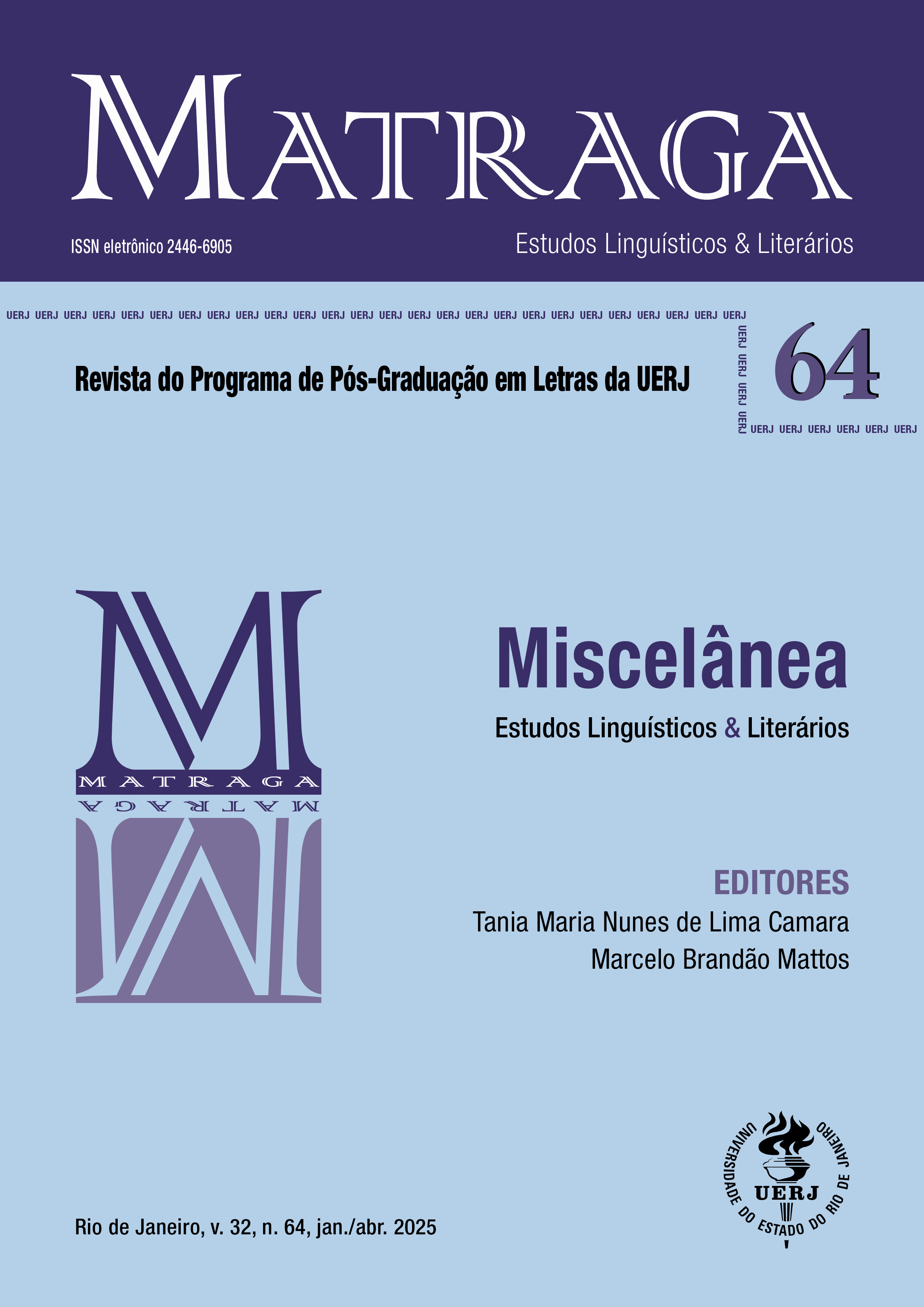The empire of choice and the “other” of literature
DOI:
https://doi.org/10.12957/matraga.2025.85859Keywords:
Literature, Teaching, Choice, OthernessAbstract
This essay comments on the centrality of the category of choice in discussions concerning the teaching of literature today. In order to defend the argument that the main debates regarding the institutionalized transmission of literature tend to revolve around the idea of choice, of which texts and authors should or should not be included in the educational context at its different levels, the essay addresses, among others, three recent episodes that highlight precisely the newly founded empire of the term: the implementation of the Brazilian National Common Core (BNCC), the publication of the letter from the Brazilian Association of Comparative Literature (ABRALIC) that approaches the need to expand studies on the teaching of literature, and, finally, the recent controversy regarding the literary works selected for the Fuvest (University Foundation for the Entrance Exam) entrance exam. What we hope to demonstrate, in a few words, is that the category of choice, despite stirring the emotions of the field of literary studies, is in contradiction with the true “other” of literature, the otherness of the work.
Downloads
References
nível em: <https://aterraeredonda.com.br/a-lista-da-fuvest/>. Acesso em: 25/02/24.
ABRALIC. Carta à Associação Brasileira de Literatura Comparada. Disponível em: <https://abralic.org.br/ downloads/2023/CARTA-ASSOCIACAO-BRASILEIRA-DE-LITERATURA-COMPARADA.pdf>. Acesso em: 27/02/2024.
ARAÚJO, Nabil. (2020). Nação e narração: por uma imagologia dos “personagens históricos” no Brasil. Mis- celânea: Revista de literatura e vida social, n. 27, p. 161-179.
ARAÚJO, Nabil. Por uma pedagogia literária do “como se”. In: CECHINEL, André. O que significa “ensinar literatura”? Florianópolis: EdUFSC; Criciúma: Ediunesc, 2017, p. 31-57.
BRASIL. Base Nacional Comum Curricular (Ensino Médio). Brasília: MEC, 2018.
BRASIL. Lei no 10.639, de 9 de janeiro de 2003. Altera a Lei no 9.394, de 20 de dezembro de 1996, que es- tabelece as diretrizes e bases da educação nacional, para incluir no currículo oficial da Rede de Ensino a obrigatoriedade da temática “História e Cultura Afro-Brasileira”, e dá outras providências. Diário Oficial da União, Brasília, DF, 10 jan. 2003. Disponível em: <http://www.planalto. gov.br/ccivil_03/leis/2003/l10.639. htm>. Acesso em: 25 fev. 2024.
BRASIL. Orientações Curriculares para o Ensino Médio. Vol. 1 – Linguagens, códigos e suas tecnologias. Brasília: Ministério da Educação; Secretaria de Educação Básica, 2006.
CARTA CAPITAL. Leituras obrigatórias da Fuvest terão só obras de mulheres. São Paulo, 22/11/23. Dispo- nível em: <https://www.cartacapital.com.br/educacao/leituras-obrigatorias-da-fuvest-terao-so-obras-de-mu- lheres/>. Acesso em: 25/02/2024.
CECHINEL, A. Reconfigurações ético-reparadoras do literário hoje. Remate de Males, Campinas, SP, v. 41,
n. 1, p. 76–97, 2021. DOI: 10.20396/remate.v41i1.8658823. Disponível em: <https://periodicos.sbu.unicamp. br/ojs/index.php/remate/article/view/8658823>. Acesso em: 23 fev. 2024.
DERRIDA, Jacques. Essa estranha instituição chamada literatura. Tradução por Marileide Dias Esqueda. Belo Horizonte: Ed. UFMG, 2014.
DURÃO, Fabio Akcelrud. Do texto à obra e outros ensaios. Curitiba: Appris, 2019.
DURÃO, Fabio Akcelrud. Teoria (literária) americana: uma introdução crítica. Campinas: Autores Associa- dos, 2011.
DURÃO, Fabio A.; CECHINEL, André. Ensinando Literatura: a sala de aula como acontecimento. São Paulo: Parábola, 2022.
GEFEN, Alexandre. Réparer le monde. La littérature française face au XXIe siècle. Paris: Éditions Corti, 2017. LUDMER, Josefina. Literaturas Pós-Autônomas. Tradução por Flávia Cera. Sopro, n. 20, p. 1-4, jan. 2010.
PERRONE-MOISÉS, Leyla. Literatura para todos. In: Literatura E Sociedade, vol. 11, n. 9, 2006, p. 16-29.
UNIASSELVI. Escrita criativa – Tecnólogo EAD. Disponível em: <https://portal.uniasselvi.com.br/gradua- cao/tecnologo/escrita-criativa/ead>. Acesso em: 25/02/24.
Downloads
Published
How to Cite
Issue
Section
License

This work is licensed under a Creative Commons Attribution-NonCommercial 4.0 International License.
Authorization
Matraga – Scientific Journal of the Post-graduate Program in Arts and Humanities of UERJ is authorized to publish the article submitted here, if it is accepted for online publication. It is attested that the contribution is original, that it is not being submitted to another publisher for publication, and that this statement is the expression of truth.
The works published in Matraga's virtual space – Scientific Journal of the Post-graduate Program in Arts and Humanities of UERJ will be automatically transferred, and your copyright is reserved to Matraga. Its reproduction, in whole or in part, is conditional on the citation of the authors and the data of the publication.

Matraga uses license Creative Commons - Attribution-Non-Commercial 4.0 International.





